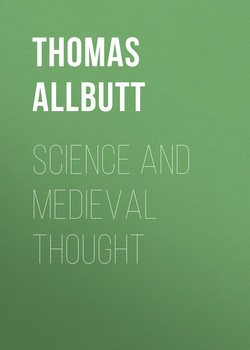Science and Medieval Thought

Реклама. ООО «ЛитРес», ИНН: 7719571260.
Оглавление
Allbutt Thomas Clifford. Science and Medieval Thought
PREFACE
INTRODUCTION1
APPENDIX
Отрывок из книги
IN the many Harveian Orations which have been delivered since the death of the founder of modern physiology the direct aspects of his honour and of his work have been exhausted; of late years the orators have concerned themselves with indirect aspects. Some of my friends have said to me that they lack a perspective view of Harvey and his work; that even highly educated men have little sense of his relation to medieval thought, or of the evolution of medieval into modern thought. Of the several stars of the constellation – of Copernicus, Gilbert, Galileo, Harvey – they had some knowledge; but how came Harvey to be at Padua? how did science spring up in North Italy? did science arise out of the womb of medicine, or contrariwise? why did natural science not flourish in the thirteenth century, and was it not a great misfortune for Europe that it did not then flourish? what were the systems of thought which in the Middle Ages preceded, encouraged or thwarted the travail of the human mind, and what of good or ill do we owe to them? These and such questions it seemed not unfitting that a Harveian Orator of this latter day should consider. Now on the philosophy of the Middle Ages, and on its relation to the era of positive science of which Harvey was perhaps the chief pioneer, there lay in a drawer in my cabinet the confused and occasional notes of many years. An interest in this thorny subject, sown in my mind at first by accident, and reawakened by these enquiring friends, had for me the charms of an old fancy, and I trust some brief essay thereon may have a temporary service; if, that is, I can touch the imagination of my hearers, and after some broken fashion bring before them a vision of the nations swayed hither and thither upon the face of Europe by a thirst for knowledge of a kind different, both in its methods and in its aims, from our own.
This oration cannot have the merit of an original study. Had I the equipment I have not the leisure to carry my investigations to the sources. Yet I may have attained to some maturity of judgment herein by long occupation of my mind since, in 1863, my old friend Mr Thomas Marshall of Leeds, sometime of St John’s College, Oxford, interested me in the life and work of Roger Bacon, the only eminent forerunner of the great naturalists of the seventeenth century.
.....
As, politically, under Diocletian and Constantine the ancient world gave place to the new, so in the third century philosophy was born again in neo-platonism4, the offspring of the coition of East and West in Alexandria, where all religions and all philosophies met together. The world and the flesh were crucified that by the spirit, man might enter into God5. Pure in its ethical mood, neo-platonism, says Harnack, led surely to intellectual bankruptcy; the irruption of the barbarians was not altogether the cause of the eclipse of natural knowledge: to transcendental intuition the wisdom of the world had become foolishness. Yet even then, as again and again, came the genius of Aristotle to save the human mind. The death of Hypatia was the death of the School of Alexandria, but in Athens neo-platonism survived and grew. Proclus, ascetic as he was, was versed also in Aristotle; and he compelled the Eastern mysteries into categories: so that on the closure of the School of Athens by Justinian (a. d. 529) a formal philosophy was bequeathed to the Faith; the first scholastic period was fashioned, and the objects and methods of enquiry were determined for thirty generations. From Aristotle Europe adopted logic first, and then metaphysics, yet both in method and in purpose Origen and Augustine were platonists; rationalised dogma lived upon dialectic, and conflicted with mysticism; but logic, dogma and mysticism alike disdained experience.
Thus, no mere external sanction, stood the Faith; threefold: from the past it brought its pompous ritual, it appealed by its subtle dogmatic scheme to the intellects, and by its devotion to the hearts of men. Through the mirage of it, when its substance had waned, Copernicus, Galileo, and Harvey had to steer by the compass of the experimental method. This was their chief adversity, and of other adversities I have to speak.
.....